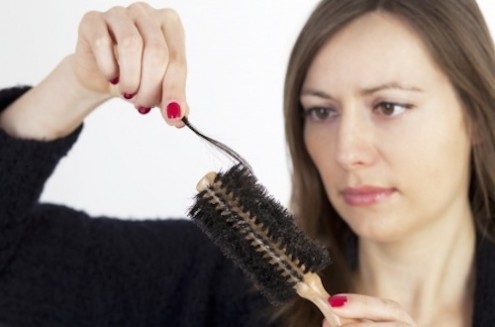According to the American College of Dermatology, the average person can lose between 50 to 100 strands of hair each day, and up to 250 if you wash your hair. If you start to notice clumps of hair falling off, however, you may be experiencing hair loss. According to Dr. Michael Smith, there are five common reasons your hair may be falling out.
Medical Reasons
If you are concerned about hair loss, the first step should be a visit to your doctor’s office, where they can review your past medical history. You may be asked to undergo lab work in order to rule out potential health conditions that cause hair loss, such as menopause, hyperthyroidism, and polycystic ovarian disease. If hair loss is especially quick, it could be an autoimmune disease like lupus, rheumatoid arthritis, or psoriasis.
Medications
As Dr. Smith points out, lots of conventional chemical prescriptions are strong drugs that can have many different side effects, and hair loss may be one of them. Acute hair loss is a side effect that can be caused by a number of different drugs, but the most common include birth control pills, anti-ulcer medication, anti-depressants, and blood pressure medications.
Poor Nutrition
Your hair, like your skin and nails, is sensitive to your overall nutrition state and can respond incredibly well to a high quality multivitamin and general healthy eating. Some of the key supplements for your hair include biotin (found in bananas and peanut butter), omega-3 fatty acids, magnesium, iron, and vitamin C.
Hormonal Imbalance
You may be familiar with male pattern baldness, which is caused by a hormone called dihydrotestosterone, or DHT. In both men and women, testosterone is converted into DHT, but sometimes the buildup can cause prostate and balding issues in men, and even women, despite the name.
Hair Styling
One area you could be overlooking is how you treat your hair. If you have hair that’s hard to grow, or tends to grow from many different spots on your head like Dr. Smith, finding a good hair stylist that can work with you is essential. Otherwise, you may end up with a spotty hairstyle that leaves you with many tiny hairs sticking up. Dr. Smith also recommends switching up your hair care routine once in a while. You can do this by switching your shampoo and conditioner, or avoiding damaging things like excessive heat from blow-dryers, having your hair tied in a ponytail, and combing it when wet, which can lead to breakage.
If you’ve checked your hormones across the board and have ruled out hormonal imbalance and medication, you can turn to supplements to help treat hair loss. A 2010 study found that when half of the volunteers were given a form of vitamin E called tocotrienol, they were able to improve the number of hairs by 35 percent. By eliminating medical and hormonal reasons for your hair loss, you can concentrate on supplementation and nutrition to keep your hair healthy and strong.
In the accompanying audio segment, Dr. Mike discusses the five reasons you're losing your hair and what you can do about it.
Could your medication be contributing to your hair loss?
Additional Info
- Segment Number: 1
- Audio File: healthy_talk/1510ht2a.mp3
- Organization: Life Extension
- Guest Website: Healthy Talk MD
- Length (mins): 10
- Waiver Received: No
- Internal Notes: NO GUEST
- Host: Mike Smith, MD
Published in
Healthy Talk w/ Dr. Michael Smith
Tagged under
